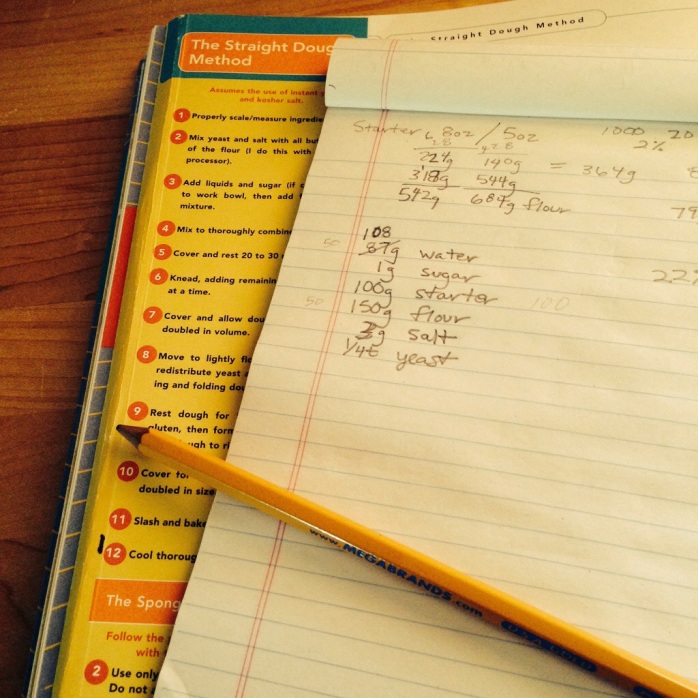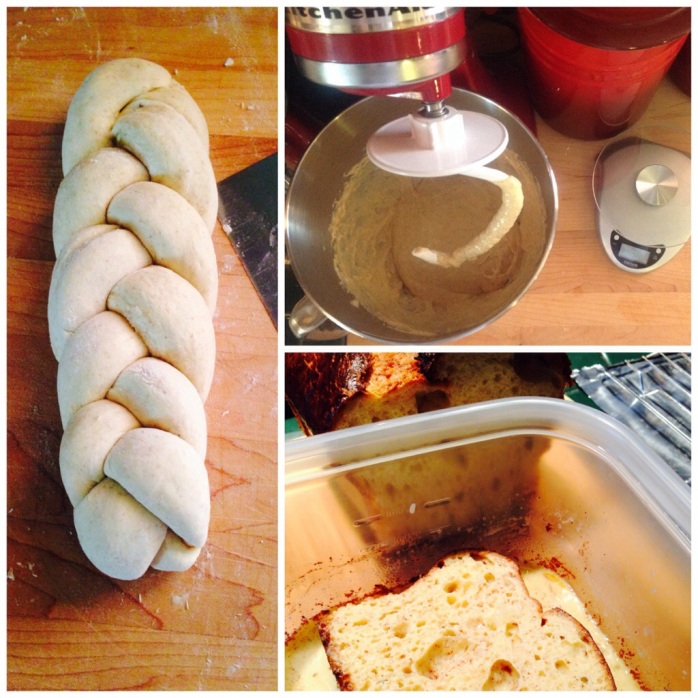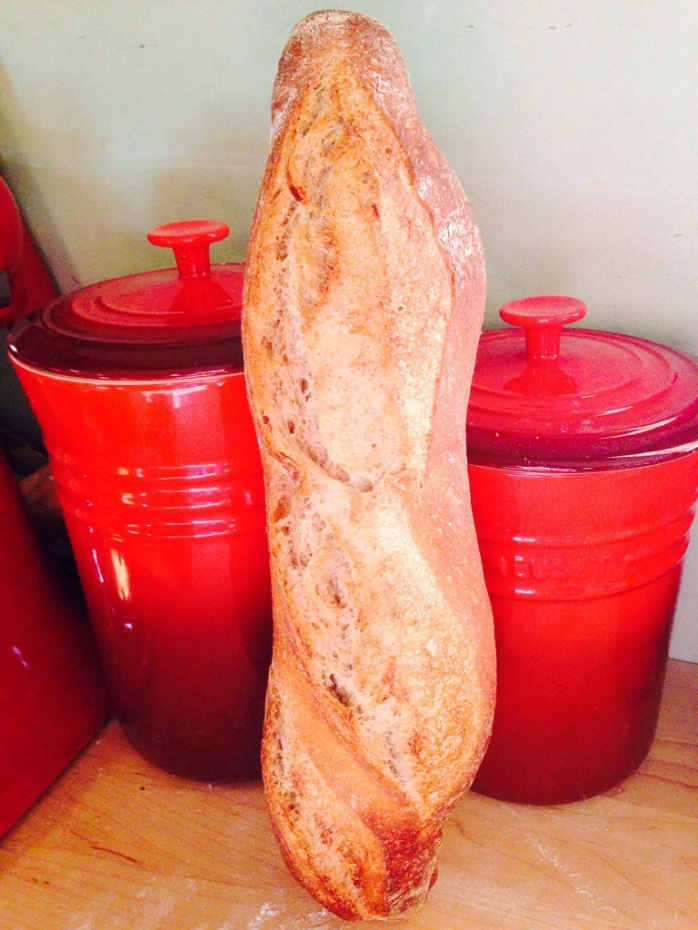Same recipe and method as previously posted, only I gave it a better initial and final shaping (with a 30-minute bench rest) and let it bench proof for two hours before slashing and baking. Since it was going into my baguette pan, I used the Leap of Faith method of baking baguettes in a convection oven.
Continue reading
Tag Archives: bread
after action report: baguette dough it is
I went through four bake cycles of various fermentation times and methods before I finally flipped the page to the Tartine Bread baguette dough and adapted it. It is certainly not just for baguettes – you can make a boule or batard, and adjust the weight of AP and bread flour used to vary the texture.
This makes two baguettes, one batard or one boule:
200g leaven
2g active dry yeast
125g water (75 degrees)
87g bread flour
163g all-purpose flour
6g salt
I broke out the mixer and gave ‘er the hook to bring the dough together (Stir on my Kitchen Aid), then let it autolyse for 30 minutes. To speed bulk fermentation, I cranked it up to 8 until the dough released from the sides of the bowl. I gave it three turns, once every 40 minutes, then shaped it into a rectangle, placed it on parchment paper and let it bench proof for an hour before baking shielded in a cold oven set to 450 for 30 minutes, then unshielded at 450 for 20 minutes.
572g pre-bake dough weight (with losses). The finished bread came out feeling light, so I knew it was a good bake, and the post-bake weight confirmed it – 473g, 82.6% of dough weight. Considering that 225g of water was in the dough, losing 45% of the water weight during baking was great.
I should have pre-shaped the dough and let it bench rest before final shaping, and I should have let the final-shaped dough proof for another 30 minutes or so before baking, but after pulling paver after paver out of my oven, I was tired of baking. No matter, though – this is a loaf that makes me want to dig my meatballs out of the freezer.
after action report: Chad loaf
I tried, I swear I tried. Same Tartine percentages compared to the flour in the recipe (20% leaven, 2% salt, 75% water). Docked it in the fridge for 11 hours; the dough came out cold but developed. I pre-shaped, bench rested then performed a final shaping and let it bench proof for 2 1/2 hours before baking. Post-bake weight was 90%…another fucking paver.
So, I’m upping my leaven to 33% and leaving it on the countertop overnight.
after action report: the one
Well, perhaps not The One, but The One That Isn’t Wet. When I pull a Chad Loaf from the oven, I know before cutting into the loaf how gelatinized shiny-crumbed wet the loaf will be from holding it in my hands (with oven mitts on, natch). This time, I popped the loaf out of the pan (I had no time to give it a proper chill, so I panned it) and I KNEW.
To confirm, I added up my ingredient weights, subtracted 2% for estimated pre-panning dough loss, then used the result as the divisor for my final loaf weight. 288g / ( 363g – 7g ) = 80% of pre-bake weight. 68g of weight lost, which was entirely water and translates to 43% of the total water in the dough lost as steam. A very good bake, indeed, considering I am rarely able to bake 10% of the dough weight out of a Chad Loaf.
So, it’s not the high-hydration dough. It’s not my leaven. It’s not the fermentation conditions. It’s not the bake conditions (I’ve done the same bake time/temp with Chad Loaves). It’s gotta be the bulk fermentation time – I could probably put together a Chad Loaf tonight, dock it in the fridge for 12 hours (without turns), then take it out tomorrow morning, knead it slightly, shape it and bake it.
country bread, nerd style: alton revisited

Having shat upon Chad Robertson’s wet Country Loaf elsewhere in the blog, I began to feel as though I should add balance to this scatological equation. I am no stranger to high-hydration doughs, nor to no-knead doughs. Before reading Tartine Bread, my preferred bread recipe was simply to take Chad-esque ratios of ingredients (with active dry yeast rather than a natural starter); mix them together in a large bowl; let the dough rest, covered, for 12-18 hours on the countertop; then shape and bake the boule. See me go home to my cooking roots and thumb my nose at artisan bread after the jump.
le pain perdu and braided brioche

Diva Oven won Round 1 yesterday: 25 minutes of shielded baking at 450 was perfect; 15 minutes unshielded baking at 450 was…not. The brioche came out slightly burnt deeply caramelized. It mattered little: that loaf is now resting within the tummies of my children, in the form of toast, le pain perdu and plain slices off the loaf. This morning, I won Round 2, this time trying the braid I spoke of previously. Given that the braid was longer than my loaf pan, I baked it (shielded) on a pizza pan for 20 minutes at 450, then unshielded at 350 for 10 minutes. Musings and a foolproof custard for French toast after the jump.
Continue reading
brioche: the champion of bread

Wet country loaf and Karmic Cockpunch notwithstanding, I still bow down at the altar (fuck you, AutoCorrect; I spelled it right the first time) of bread built by Chad Robertson. I didn’t understand bread as a fundamental science until I read Tartine Bread. Sure, Alton Brown has an entire chapter devoted to bread in I’m Just Here For More Food, and he gives a good book knowledge of the process. With Chad, though, you are given an awareness of your environment, your ingredients and your cooking appliance that will have far more influence on the edibility of your bread than the recipe you start from. Actual talk about brioche after the jump.
chad, don’t make me cockpunch you

Why did I have to read in Food and Wine that your fucking country loaf is wet, Chad? It certainly wasn’t in your book – ‘glistening’ and ‘tender crumb’ was as close as you ever got to informing your (paying!) readers that a loaf would be a bit wet, even after being fully cooked. I’ve agonized over the country loaf for years. The Fresh Loaf has scores of threads devoted to bakers who lament the moistness of their otherwise-perfect loaves.
Would it have killed you to have added that little disclaimer to your book, your video, your website? How much discouragement and self-doubt could have been prevented by one teensy little admission on your part, that people have accused your bread of being wet?
Dude, I still love you, man. Your brioche is a gift from the gods of grain and your baguette dough makes for a fantastic batard as well as the perfect base for croissants. But the baking universe owes you a massive cockpunch. Just sayin’.
